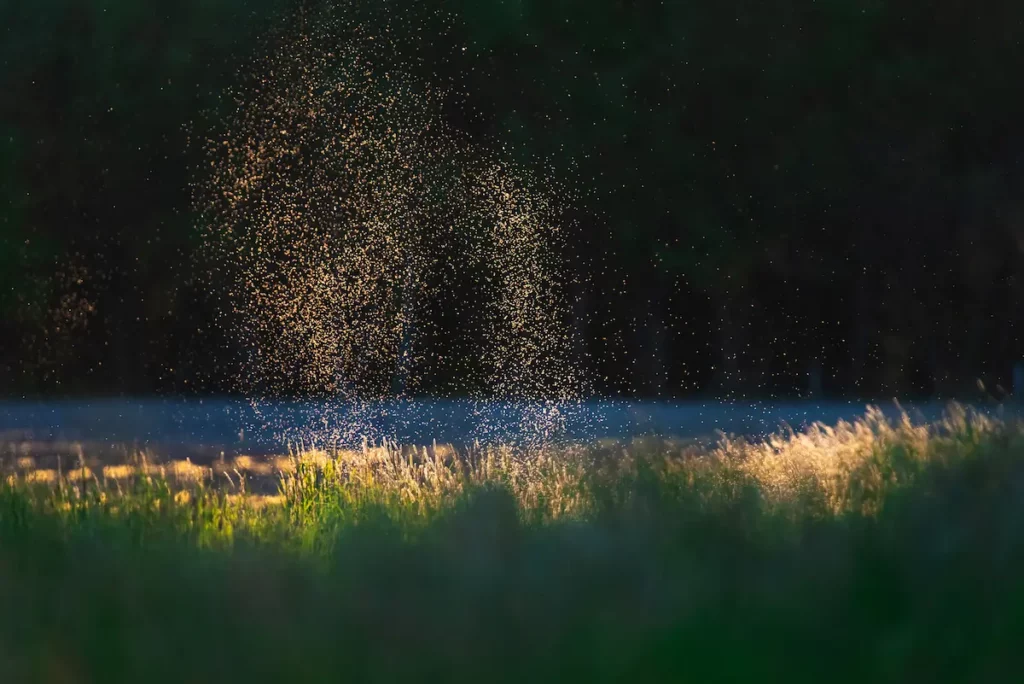Wondering if mosquitoes are bad up in Alaska? Due to an abundance of water sources, such as marshlands and lakes, regular rain, and mild temperatures, the environment is ripe for mosquito breeding. However, the population of mosquitoes is not as dense in cities, above treelines, or in places with even mild wind, which makes them less of a problem than the myths state. Alaskan mosquitoes also reportedly spread no diseases when they bite.
Mosquitoes are annoying no matter where you are. Horrible, buzzy little nuisances which serve only as a food source to much cuter things. But mosquitoes are infamous for crossing the line from annoying into dangerous, arriving in frightening swarms, like they are said to do in Alaska.
Mosquitoes are a pain in the neck, legs, arms, and pretty much anywhere else exposed – and even a ‘not as bad as monstrous, terrifying swarms’ problem is still a problem. So, let’s discuss some of the tactics for mosquito avoidance down below.

Related Reading: The Worst Places in the World with Mosquitoes
How To Avoid Mosquitoes in Alaska
Stay In the Cities, Mountains or Coastlines
I thought I’d phrase it like that because it does a good job showing you just how unlikely you are to get swamped by those rumored gigantic swarms. Alaskan mosquitoes have trouble flying in even the slightest breeze, so anywhere which is likely to suffer from even the mildest of wind is inhospitable to them, and that includes the air generated by cars as they rush past.
They also don’t survive well above the treelines for the same reason, so if you’re worried about Alaskan mosquitoes, you really shouldn’t be unless you’re planning on camping in
- Swamps
- Next to lakes
- In Marshlands
- In the middle of forests
You know, anywhere where there’s stagnant water and equally still air. So that means unless your plans for holidays involve those places or specifically traveling to the rivers for bear watching and salmon fishing, they rarely enter places where tourists generally like to go.
Avoid Their Active Time
One of the easiest and most passive ways to avoid mosquitoes is simple: don’t be out and about the same time they are! Mosquitoes don’t live very long and die out due to the cold of the winter, and in the spring, they’re getting their groove on again to begin building up their numbers so they’re only really an issue during the summer before autumn kills them off again.
More specifically, you want to avoid the second week of June to the last week of July. They are also said to be the most active at dawn and at dusk on these days, so make sure you’re not out wandering in your summer clothes at sunset around these times.
Wear The Right Clothes
You’d be surprised what a difference wearing the right clothes can be. For example, wearing neutral colors has been shown to be harder for mosquitoes to spot, with them being more attracted to the darker colors. Blue seems especially attractive to them.
Better colors are:
- Pale
- Neutral
- Khaki
These clothes you’re wearing should also be loose and long-sleeved to act as a barrier. Tighter weaved clothing seems to work better to keep them away as well.
The final piece to your new outfit should be a nice head net, which is a fetching little hat with a net that hangs down over the face and neck, ending at the collarbone. This should keep the little suckers away from your skin.
Wear Mosquito Repellent
Fairly simple. What’s not covered by clothes should have some bug repellent on it, or perhaps, if you’re truly thinking of braving the Alaskan wilds, then your clothes should be the ones with bug repellent on them.
You see, most would recommend a brand of bug repellent named DEET. For the most part, 30 or 40% DEET is reportedly all you’ll ever need, but if your holiday plans include camping or hiking in mosquito territory, then 95-100% DEET is guaranteed.
Now, DEET is a very powerful chemical, and whilst a champion of bug repellent, it’s hardly environmentally friendly and a possible carcinogen, hence why it has a very particular way of applying it:
- Apply only to the face and neck
- Apply to clothes anywhere else on your body
- If you’ve put on sunscreen, wait half an hour at least before applying DEET
- Never apply over any cut or irritated skin
- Read manufacturer’s instructions carefully (DEET has been known to melt certain camera cases and jacket fabrics)
- Finally, rinse or take a shower as soon as you’re out of mosquito areas
Now, that may sound a little unappealing to you. Maybe even the word ‘scary’ could be applied. If that’s you, then no problem. There are definitely some others out there, including permethrin which has a similar effect to DEET but has been approved by the US Environmental Protection Agency since 2003.
Permethrin is also applied to clothes, like DEET is, and boasts that one dosage of the stuff can last on someone’s clothes for up to 70 washes, meaning you won’t be running out in the middle of mosquito-infested forests anytime soon.
But if your style is even more natural, you could try things like citronella, which can also act as a mosquito repellent. There are plenty of options out there, but those within Alaska would stand by and put their money on DEET the most.
[amazon bestseller=”deet mosquito repellent” items=”3″ template=”table”]
Related Reading: Will Bleach Kill Mosquito Larvae? [ANSWERED]
Conclusion
Mosquitoes are not as bad in Alaska as the rumors say, as their highest span of activity is just over a month all in all and they don’t tend to come near cities, coastlines or mountains. However, if you plan to visit during those months and want to be safe traveling to forests and waterways, then there are options out to make your trip just a bit more bug-free.
Traveling where and when they’re least active, wearing loose-fitting cotton clothes, (avoiding dark colors) with a head net, and wearing some kind of repellent, whether it be commercial DEET or more natural citronella or something in between, will do so much to ensure your holiday isn’t plagued by pesky little mosquitoes.
